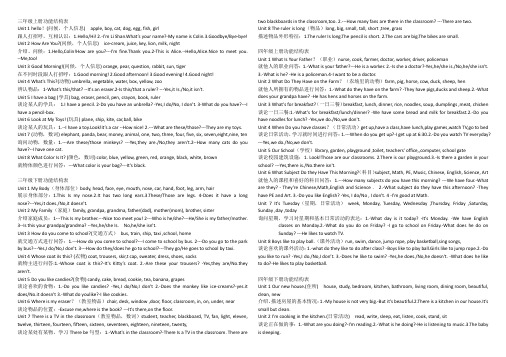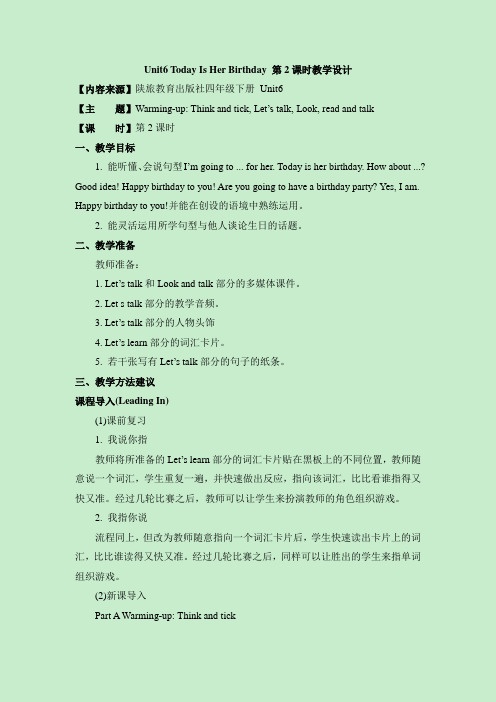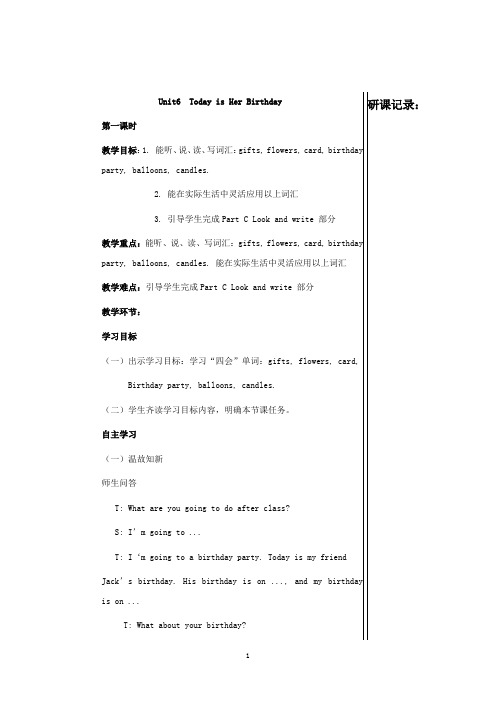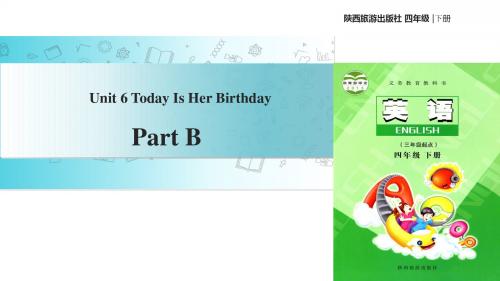四年级英语下册 Unit 6 Today Is Her Birthday(第一课时)教案 陕旅版
- 格式:doc
- 大小:15.50 KB
- 文档页数:2

三年级下册英语教学计划一、教材简况本套英语教材由陕西旅游出版社,由教育部审定的义务教育教科书。
根据教育部颁布的《全日制义务教育普通高级中学英语课程标准(实验稿)》规定的小学毕业应达到耳机水平的要求精心编写的。
本教材供三年级使用。
本教材根据小学生的年龄、心理特点和生活实践、教材的编写注重激发和培养学生的学习语言的兴趣和信心。
有了兴趣和信心,学生们就有了积极进取的学习态度。
在本套教材中,提供了大量的生活情景,目的就是同学们可以在听听,做做,说说,玩玩,演演中认识字母,学习单词,说句子,然后再将所学知识积极地运用到生活中去。
通过本教材的学习,一定能为将来的学习打下良好的基础。
二、学生状况本班共有学生两名,男女生各一名,他们对英语有一定兴趣,但由于还在初学阶段,因此听说读写各方面在运用上都欠熟练。
在今后的的学习中需要培养良好的学习习惯。
最重要的是要激起学生对英语学习的自信心。
三、教学重点1、教材共有8课,每课中都有要求学生熟记的单词和句型操练,力求在教学中熟练掌握。
2、听、说练习贯穿了整个教材,激发了孩子们在玩中听、说英语,是教材与教者共同始终追求的目标。
四、教学难度1、对单词和短语的熟记和完全掌握。
2、每个单元中出现的重点句型会说会用。
3、在学习过程中了解中西方文化的差异,大胆运用英语相互交流进行简单对话。
4、激发学生的学习兴趣,加强学生听、说、读、写等基本技能。
五、教学措施1、利用直观教具或多媒体,创设情境、情景,师生共同参与,努力完成教学活动及任务。
2、鼓励学生大胆讲英语,学会用英语进行简单的交际。
3、促进学困生的转化,鼓励优等生再接再厉。
四年级下册英语教学计划一、教材简况本册书共分12课,要求掌握92个单词,能看图识字,能在指认物体的前提下认读所学词语,能在图片的帮助下读懂简单的小故事,能正确书写字母和单词。
要让学生养成每天定时、定量听读英语的习惯:家校合力培养孩子每天听读英语的习惯,也可建议采用放录音,营造语言氛围,让孩子有意、无意地听,省时又有效。

三年级上册功能结构表Unit 1 hello!(问候,个人信息) apple, boy, cat, dog, egg, fish, girl跟人打招呼,互相认识:1.Hello/Hi! 2.-I’m Li Shan.What’s your name?-My name is Colin.3.Goodbye/Bye-bye! Unit 2 How Are You?(问候,个人信息) ice-cream, juice, key, lion, milk, night介绍、问候:1.Hello,Colin!How are you?---I’m fine.Thank you.2-This is Alice.--Hello,Alice.Nice to meet you. --Me,too!Unit 3 Good Morning!(问候,个人信息) orange, pear, question, rabbit, sun, tiger在不同时段跟人打招呼:1.Good morning! 2.Good afternoon! 3.Good evening! 4.Good night!Unit 4 What's This?(动物) umbrella, vegetable, water, box, yellow, zoo辨认物品:1-What's this/that? --It's an eraser.2-Is this/that a ruler? ---Yes,it Is./No,it isn't.Unit 5 I have a bag (学具) bag, eraser, pencil, pen, crayon, book, ruler谈论某人的学具:1.I have a pencil. 2-Do you have an unbrella? -Yes,I do/No, I don’t. 3-What do you have?---I have a pencil-box.Unit 6 Look at My Toys! (玩具) plane, ship, kite, car,ball, bike谈论某人的玩具:1.--I have a toy.Look!it’s a car --How nice! 2.---What are these/those?---They are my toys. Unit 7 (动物,数词) elephant, panda, bear, money, animal, one, two, three, four, five, six, seven,eight,nine, ten 询问动物,数量:1.---Are these/those minkeys? ---Yes,they are./No,they aren't.2--How many cats do you have?--I have one cat.Unit 8 What Color Is It? (颜色,数词) color, blue, yellow, green, red, orange, black, white, brown就物体颜色进行问答:---What color is your bag?---It's black.三年级下册功能结构表Unit 1 My Body(身体部位)body, head, face, eye, mouth, nose, car, hand, foot, leg, arm, hair展示身体部分:1.This Is my nose.2.It has two long ears.3.These/Those are legs. 4-Does it have a long nose?---Yes,it does./No,it doesn't.Unit 2 My Family(家庭)family, grandpa, grandma, father(dad), mother(mom), brother, sister介绍家庭成员:1---This Is my brother.---Nice too meet you! 2---Who is he/she?---He/She is my father/mother. 3--Is this your grandpa/grandma? --Yes,he/she Is. No,he/she isn't.Unit 3 How do you come to school?(交通方式)bus, train, ship, taxi ,school, home就交通方式进行问答:1.---How do you come to school?---I come to school by bus. 2---Do you go to the park by bus?---Yes,I do/No,I don't. 3---How do they/does he go to school?---They go/He goes to school by taxi.Unit 4 Whose coat iIs this? (衣物) coat, trousers, skir,t cap, sweater, dress, shoes, socks就物主进行问答:1.-Whose coat is this?-It's Kitty’s coat. 2.-Are these your trousers? -Yes,they are/No.they aren’t.Unit 5 Do you like candies?(食物) candy, cake, bread, cookie, tea, banana, grapes谈论喜欢的食物:1.-Do you like candies? -Yes,I do/No,I don't 2.-Does the monkey like ice-creams?-yes.it does/No.it doesn't 3.-What do youlike?-I like cookies.Unit 6 Where is my eraser?(教室物品)chair, desk, window ,door, floor, classroom, in, on, under, near谈论物品的位置:-Excuse me,where is the book? ---It's there,on the floor.Unit 7 There is a TV in the classroom(教室物品,数词)student, teacher, blackboard, TV, fan, light, eleven, twelve, thirteen, fourteen, fifteen, sixteen, seventeen, eighteen, nineteen, twenty,谈论某处有某物,学习There be句型:1.-What's in the classroom?-There Is a TV in the classroom. There are two blackboards in the classroom,too. 2.---How many fans are there in the classroom? ---There are two.Unit 8 The ruler is long(物品)long, big, small, tall, short ,tree, grass描述物品外形特征:1.The ruler Is long.The pencil is short. 2.The cars are big.The bikes are small.四年级上册功能结构表Unit 1 What Is Your Father?(职业)nurse, cook, farmer, doctor, worker, driver, policeman就他人的职业问答:1.-What is your father?---He is a worker. 2.-Is she a doctor?-Yes,he/she is./No,he/she isn't.3.-What is he? -He is a policeman.4-I want to be a doctor.Unit 2 What Do They Have on the Farm?(农场里的动物)farm, pig, horse, cow, duck, sheep, hen就他人所拥有的物品进行问答:1.-What do they have on the farm? -They have pigs,ducks and sheep.2.-What does your grandpa have? -He has hens and horses on the farm.Unit 3 What's for breakfast?(一日三餐)breakfast, lunch, dinner, rice, noodles, soup, dumplings ,meat, chicken 谈论一日三餐:1.-What's for breakfast/lunch/dinner? -We have some bread and milk for breakfast.2.-Do you have noodles for lunch? -Yes,we do./No,we don't.Unit 4 When Do you have classes?(日常活动)get up,have a class,have lunch,play games,watch TV,go to bed 谈论日常活动,学习就时间进行问答:1.---When do you get up?-I get up at 6:30.2.-Do you watch TV everyday? ---Yes,we do./No,we don't.Unit 5 Our School(学校)library, garden, playground ,toilet, teachers' office,,computer, school gate谈论校园建筑设施:1. Look!Those are our classrooms. 2.There is our playground.3.-Is there a garden in your school? ---Yes,there is./No.there isn't.Unit 6 What Subject Do they Have This Morning?(科目)subject, Math, PE, Music, Chinese, English, Science, Art 就他人的课程和喜好的科目问答:1.---How many subjects do you have this morning? ---We have four.-What are they? - They’re Chinese,Math,English and Science . 2.-What subject do they have this afternoon? -They have PE and Art. 3.-Do you like English? -Yes, I do/No , I don't. 4 -I’m good at Math.Unit 7 It's Tuesday(星期,日常活动)week, Monday, Tuesday, Wednesday ,Thursday, Friday ,Saturday, Sunday ,day ,today询问星期,学习对星期和基本日常活动的表达:1.-What day is it today? -It's Monday. -We have English classes on Monday.2.-What do you do on Friday? -I go to school on Friday.-What does he do on Sunday? ---He likes to watch TV.Unit 8 Boys like to play ball.(课外活动)run, swim, dance, jump rope, play basketball,sing songs,谈论喜欢的课外活动:1.-what do they like to do after class? -Boys like to play ball.Girls like to jump rope.2.-Do you like to run? -Yes,I do./No,I don’t. 3.-Does he like to swim? -Yes,he does./No,he doesn't. -What does he like to do?-He likes to play basketball.四年级下册功能结构表Unit 1 Our new house.(住所) house, study, bedroom, kitchen, bathroom, living room, dining room, beautiful, clean, new介绍、描述房屋的基本情况:1.-My house is not very big.-But it’s beautiful.2.There is a kitchen in our house.It’s small but clean.Unit 2 I’m cooking in the kitchen.(日常活动) read, write, sleep, eat, listen, cook, stand, sit谈论正在做的事:1.-What are you doing?-I’m reading.2.-What is he doing?-He is listening to music.3.The baby is sleeping.Unit 3 Is it snowing?(天气) rain, snow, cloud, wind, sky, raincoat, glasses描述天气,提出建议:1.Look at the clouds in the sky.2.-Is it snowing?-Yes,it is./No,it isn’t.3.Please take a raincoat.Unit 4 What do you do on Saturday?(日常活动) fly a kite, play football, do exercise, see a film, do some washing, climb the mountain, do one’s homework谈论日常活动安排:1.-What do you do on Saturday?-I often do my homework on Saturday.2.-Does he often fly a kite on Saturday?-Yes,he does./No,he doesn’t.Unit 5 Where are you going?(场所,假日活动) park, cinema, shop, bookstore, hospital, bus stop, buy a story book, tomorrow, Children’s Day谈论近期计划、打算,学习be going to 结构:1.-Where are you going?-We are going to the shop.2.-Are there going to the cinema?-Yes,they are./No,they aren’t.3.Tomorrow is Children’s Day.What are you going to do?-I’m going to the park.Unit 6 Today is her birthday.(生日,年龄数词) birthday, gift, flower, card, ballon, party, candle, thirty, forty, fifty, sixty, seventy, eighty, ninety, hundred继续学习be going to结构,并学习就年龄问答:1.I’m going to buy a gift for her.Today is her birthday.2.Happy birthday to you!3.-Are you going to have a party?-Yes,we are.4.-How old are you?-I’m eleven years old.Unit 7 Be careful!(交通安全) stop, wait, turn right, turn left, traffic lights, cross the street, be careful, wait a minute学习交通常用语、特定标识的意义以及祈使句的用法:1.Be careful.Look at the traffic lights.2.The light is red now.Don’t cross the street.Please wait a minute.Unit 8 What can you do?(日常生活) speak, hear, see, help, open, close, take photos, play the music就进行某项活动的能力进行问答:1.-What can you do?-I can sweep the floor.2.-Can you take photos?-五年级上册功能结构表Unit 1 Get up on time!(日常生活,时间安排) clock, wall ,come in ,sit down, be late ,play computer games学习如何就时间及日常生活进行回答:1.-What time is it?-It’s seven o’clock.2.-What time do you get up?-I get up at six thirty.初步学习请求用语:-May I come in?-Come in,please.学习道歉用语:-I’m sorry.-That’s all right. Unit 2 Be helpful at home!(家务劳动) make the bed ,sweep the floor ,do the dishes, water the flowers ,clean the windows ,cook the meal, wash the clothes学习can表示请求的用法及can的综合运用:1.-Can you sweep the floor?-Of course./OK.2.-What can you do at home?-I can make the bed and do the dishes.对他人的劳动给予肯定和表扬:Great!You’re very helpful. Unit 3 My favorite food is hamburgers.(饮食,喜好) China, the USA, fruit, drink, food, chocolate, hamburger, delicious, coffee, love就他人喜好进行问答及表述:1.-What’s your favorite food?-My favorite food is hamburgers.2.I like dumplings best.3.My brother loves chocolate.That’s his favorite.Unit 4 At table(用餐) table, spoon, knife, chopsticks, fork, cut, use, pass, beef, give谈论如何正确使用餐具:e the fork with your left hand and use the knife with your right hand.进一步学习请求及回答:1.-Would you please pass me the spoon?-Here you are.2.-Would you give me some noodles? -Of course.And here are the chopsticks.Unit 5 Can you tell me the way to the supermarket?(问路) supermarket, Children’s Park, beside, behind, between, take a bus, get off the bus学习如何问路或指路-Excuse me. Is there a supermarket near here?/Can you tell me the way to the supermarket?/How can I get to the supermarket?-Go along the street and you can see a school on the left/right.The park is beside/behind it.There is a supermarket between the school and the bookstore.Unit 6 How much is it?(购物) shirt, T-shirt, a pair of shorts/trousers/glasses/shoes, two pairs of socks学习如何购物并询问价格:1.-What can I do for you?-I want to buy a pair of shorts.2.-Can I help you?-Yes,I’d like a T-shirt.3.-How much is it/are they?-It’s/They’re fifty yuan.4.How about this one/these ones?-It looks/They look nice.5.I’ll take it./We’ll take them.Unit 7 She looks tall and thin.(外貌特征) aunt, uncle, kid, friend, thin, strong, old, young谈论人物的外貌特征及爱好、特长:1.She looks tall and thin.2.She likes sports.She can run very fast.3.She looks beautiful in the red dress.Unit 8 Where are you from?(个人情况、国籍、家乡) visit, city, hotel, the UK, France, Australia, map,far away, far from就国籍、家乡进行问答1.-Where are you from?/Where do you come from?-I am/come from China.2.Is it far from here?-Not very far.就预订房间进行表述1.I’d like to have a room.2.Welcome to our hotel.Have a good time.五年级下册功能结构表Unit1 How are you feeling now?(情感)feel happy,feel sad,feel tired, feel angry, go out to play, make a snowman 学习就情感进行表述及问答:1.You look sad.2.-How are you feeling now?-I’m feeling very tired.3.Are you happy/sad/...?Yes,a little.4.Miss White is angry.Why is she angry?-Colin is late again.This makes her very angry. Unit 2 Spring is coming!(四季及其活动) spring, summer, autumn, winter, season, plant trees, ride a bike,go swimming, March, April, May学习问答四季的情景及相关活动并简单描述:1.-What do you do in spring?-I often fly kites with my friends.Sometimes we go climbing.2.It’s warm and trees are green.We like to go on a picnic.3.Summer is hot.But we can go swimming and eat watermelons.Unit 3 Spring begins from March.(季节、月份) January, February, June, July, August, September, October, November, December,了解必要的序数词first, second, third, fifth, eighth, ninth,twelfth, twentieth就最喜欢的季节及原因进行问答并陈述四季月份:1.-Which is your favorite season?- Autumn.-Why?-Because autumn begins from September.It is cool and the trees become red and yellow.The mountains are very beautiful.I can go climbing.2.There are four seasons in a year.Each season has three months.Unit 4 He lives in a village.(个人情况-居住地) bird, snake, tomato, potato, village, lake, river就居住地及其环境进行问答及表述:1.-Do you live in a city?-No.I live in a village far from the city.2.-Is the village big?-No.It is small,but beautiful.3.Lele and his parents live in a small vilage.They plant many vegetables. Unit5What’s the weather like today?(天气、衣着)weather report, sunny, windy, cloudy, rainy, snowy, moon,star 就天气情况进行问答和表述:1.What’s the weather like?/How is the weather?-It’s cloudy/windy/sunny.2.It will be sunny and warm tomorrow. You’d better wear your T-shirt.Unit 6My holiday.(假期)travel,enjoy the visit,place of interest,the Palace Museum,the Great Wall,the West Lake 谈论假期活动:1.-May Day is coming.Where will you go on the holiday?-I will go to Hainan with my parents.2.-What will you do this summer?-I will travel to Beijing.Unit 7 I have a headache.(健康) have a cold, have a cough, have a fever, have a headache, have a toothache, have a stomachache, see a doctor, drink more water, take some medicine, stay in bed, have a good rest就个人的身体状况进行问答和表述:1.I feel very bad today.2.-What’s wrong/the matter/the trouble with you?-I have a bad cold.3.Don’t worry about your lessons.4.I’m sorry to hear that.Unit 8 Have a good habit!(习惯养成) litter on the floor, talk loudly in class, speak with mouth full, make anoise, keep quiet, wait in line讨论习惯的好与坏,并提出合理建议:1.-Don’t litter on the floor./You shouldn’t tell lies.It’s a bad habbit.-I’m sorry.I won’t.2.We shouldn’t make a noise in the library.We’d better keep quiet and we should have a good habbit.3.Don’t read in bed.It’s bad for your eyes.You’d better read at the desk.六年级上册功能结构Unit 1 It’s time to play the violin.(日常活动与时间安排) play the violin, do eye exercises, play sports, learn English, have a rest, take out the book, brush one’s teeth谈论日常活动的时间安排:1.-Can I go out to play?-I’m afraid you can’t.It’s time to play the violin.2.-I’m sorry.-It doesn’t matter.3.On Saturday morning,Li Shan always gets up at six.Unit 2 I’m healthy.(饮食与健康) healthy, take a walk, play ping-pong, play tennis, go boating, go skating, go shopping, a lot of, how often, once, twice, three times a week谈论活动的频率及健康的保持:1.You look healthy.2.-Do you often play sports?-Yes,I do./No,I don’t.3.How often do you drink milk?-I drink milk every day.4.Kitty is a healthy girl.She goes to bed early and sleeps nine hours every night. She goes boating in the park once a month.She does well in her study.Unit 3 Care for the earth.(保护环境) care for the earth, cut down trees, pick flowers, make the air dirty/clean, waste water, drive a car谈论如何为保护环境做一些力所能及的事:1.Why not go in your dad’s car?-We should drive the car today.Because today is World Car Free Day.It’s time to do something for our earth.2.We have only one earth.We should care for it.Unit 4 Let’s go on a picnic.(户外活动) go on a picnic, take out of, put into, get to the park, meet at the gate学习针对某项活动提出各自的建议:1.-Are you free next Saturday?-Yes.What’s up?2.What shall we take?3.Shall we meet at the gate of the park?4.When shall we meet,8:00 or 8:30?Unit 5 It was here just now.(衣物、今夕对比) scarf, wallet, sunglasses, gloves, warm jacket, rain boots, school bag, in front of学习谈论物品过去及现在的位置:1.It was here just now.Oh,it’s behind the door.2.It was in front of the house yesterday,but now it isn’t there.3.-Was there a playground thirty years ago?-Yes,there was./No,there wasn’t. Unit 6 What did you do last weekend?(周末活动、娱乐活动) watch a show, look after grandma, do housework, see a friend, have a match, go away继续学习一般过去时态,谈论过去的活动:1.-What did you do last weekend?-I did some housework.I cleaned the rooms and washed the clothes.2.-What happened to her?-When she was eight years old,her mother was ill in bed.She did all the housework by herself.Unit 7 I had a good time.(假期活动) play beach volleyball, visit the museum, buy some gifts, eat sea food, make a cake, cousin继续学习一般过去时态,讨论过去的假期活动:1.-Did you go out to play last weekend?-No,I didn’t. I stayed at home.-What did you do at home?-I learned to cook and made a big cake.2.-Where did you go last weekend?-I flew to Hainan with my st summer holiday, Su Nan went to Beijing with his parents.Unit 8 New Year’s party(节日活动) laugh, cry, tell a joke, act a play, play the guitar, win a gift, funny, at the begining, finally谈论新年晚会:1.-What do you think of our party?-It was great.2.-Do you like Li Shan and Wu Chen’s short play?-Yes,they acted it well.3.Class One had a New Year’s party on December 31 st. 六年级下册功能结构Unit 1 May I speak to Kitty?(打电话) mobile phone, make a phone call, go on the Internet, send a message, read an e-book, send an e-mail, take a message学习打电话用语,谈论手机的利弊及如何合理使用手机:1.-Hello,may I speak to Kitty?-Sorry,Kitty is out.This is Kitty’s sister speaking.Can I take a message?-Sure.2.-Hello!Is that Liu Zhaoyang?-Yes,this is Liu Zhaoyang speaking.Who is that?3.I won’t use it to go on the Internet or read e-books.I’ll only use it to make phone calls and learn English.Unit 2 What would you like?(点餐) a bowl of noodles, a plate of beef, a glass of juice, a bottle of water, a cup of tea, a piece of bread学习如何点餐:1.-What would you like to eat?-We’d like two bowls of noodles.-What kind of noodles would you like,beef noodles or tomato noodles?-Beef noodles,please.2.-Would you like something to eat?-May I have some juice?-Sure.Unit 3 Who’s that man?(职业) pupil, actor, singer, reporter, scientist, police officer, basketball player谈论他人职业:-What does he do?/What is he?-He’s a doctor.He is from Shanghai.But he worked on the grassland for forty years.Unit 4 At the sports meeting.(文体活动) have a sports meeting, throwing, 100-meter race, long jump, high jump, running race, take part in谈论校园运动会并学习书信的正确格式:-What sport did you take part in?-I took part in the boys’ 100-meter race.-Did you win?-Yes.I was the first in the 100-meter race.Unit 5 What is he like?(人物性格) clever, outgoing, shy, kind, friendly, hard-working, serious, lazy谈论人物性格特点:1.-What is he like?-He is kind to us.2.-What do you think of her?-She is a little serious.3.Mrs. Brown wasn’t angry.She took out a book and smiled,’What a hard-working boy!’Unit 6 A school sale.(生活) notebook, magazine, glue, story book, model plane, toy car, a pair of scissors谈论学校的义卖情况:1.There will be a sale at our school.2.-What will you sell?-I will sell some magazines and color pencils.3.-What shall we do with the money?-We’ll give it to the poor puipls in the mountains.Unit 7 Shanghai is in the southeast of China.(城市方位、假日生活) east, west, south, north, northeast, southeast, northwest, southwest学习表述城市方位并结合方位词谈论度假地,学习日记的正确格式:-Hainan is in the south of China.It’s too hot in summer.-How about Shanghai?It’s in the southeast.It’s by the sea and it is not too hot.-Great.There are many places of interest.Unit 8 What’s your dream?(梦想) dream, become a tour guide, travel around the world, land on the moon, go to college, join the National Team, study the stars谈论理想:1.-What is your dream?-I want/would like/hope to be a scientist.2.-Did you have a dream when you were young?-Yes.I wanted/hoped to be a tour guide and travel around the world.时态专练写出下列动词的第三人称单数drink ________ go _______ stay ________ make ________look ________have_______ pass_______ carry________ plant________ teach_______come________ watch______study______brush________do_________写出下列动词的现在分词:run__________ swim _________make__________write________have_________dance_________put_________ live_______take_________ come ________get_________stop_________sit ________ begin________ shop___________写出下列动词的过去式fly_______ are ________drink_________ play_______ go________make ________does_________ dance________ worry________ eat__________ draw________ put______throw________ sell________ see_________用括号内动词的适当形式填空。

Unit 4 What Do You Do on Saturday?第一课时一、英汉互译。
1.fly a kite______________2.做运动______________3.climb the mountain ______________4.踢足球______________5.do some washing______________6.做作业______________二、观察图片,选择正确答案。
1. ( )2. ( )3. ( )4. ( )A. do her homeworkB. climb the mountainC. do some washingD. do exercise三、给单词、短语选择正确的汉语意思。
( ) 1. exercise A. 跳舞 B. 唱歌 C. 锻炼( ) 2. film A. 感觉 B. 电影 C. 一直( ) 3. football A. 篮球 B. 排球 C. 足球( ) 4. mountain A. 山 B. 跳绳 C. 踢毽子( ) 5. kite A. 画画 B. 风筝 C. 弹琴参考答案一、1. 放风筝 2. do exercise 3. 爬山4. play football5. 洗衣服6. do homework二、1. D 2. C 3. B 4. A三、1. C 2. B 3. C 4. A 5. BUnit 4 What Do You Do on Saturday?第二课时一、选词填空。
(1) What do you do on the _________?(2) He often _________ after school.(3) There is a wind. Let’s _________.(4) Let’s play football _________Mr. Zhao.(5) My mom_________ reads a book on Sunday.二、选词填空。

Unit6 Today Is Her Birthday 第2课时教学设计【内容来源】陕旅教育出版社四年级下册Unit6【主题】Warming-up: Think and tick, Let’s talk, Look, read and talk【课时】第2课时一、教学目标1. 能听懂、会说句型I’m going to ... for her. Today is her birthday. How about ...? Good idea! Happy birthday to you! Are you going to have a birthday party? Yes, I am. Happy birthday to you!并能在创设的语境中熟练运用。
2. 能灵活运用所学句型与他人谈论生日的话题。
二、教学准备教师准备:1. Let’s talk和Look and talk部分的多媒体课件。
2. Let s talk部分的教学音频。
3. Let’s talk部分的人物头饰4. Let’s learn部分的词汇卡片。
5. 若干张写有Let’s talk部分的句子的纸条。
三、教学方法建议课程导入(Leading In)(1)课前复习1. 我说你指教师将所准备的Let’s learn部分的词汇卡片贴在黑板上的不同位置,教师随意说一个词汇,学生重复一遍,并快速做出反应,指向该词汇,比比看谁指得又快又准。
经过几轮比赛之后,教师可以让学生来扮演教师的角色组织游戏。
2. 我指你说流程同上,但改为教师随意指向一个词汇卡片后,学生快速读出卡片上的词汇,比比谁读得又快又准。
经过几轮比赛之后,同样可以让胜出的学生来指单词组织游戏。
(2)新课导入Part A Warming-up: Think and tick教师先指导学生说出与各幅图片相对应的短语,然后引导他们创设情境:假设今天是母亲生日,让学生想一想要为各自的母亲做些什么,在相应的围片下面打“√”,并就此对话:T: What are you going to do for your mother on her birthday?Ss: I am going to draw a picture / buy some balloons / buy some flowers / sweep the floor / sing a song / buy a birthday cake.课程展示活动和过程的设计建议(presentation)(1)新课展示Part A: Let’s talk教师戴上Wu Chen的头饰,并用课件出示Let’s talk部分Wu Chen奶奶的图片,和学生做如下问答:T: Hello! I am Wu Chen. Look at this picture. Can you guess who she is?S1: She is your grandma.T: Yes. She is my grandma. Today is her birthday. Let’s say“Happy birthday!”to her.Ss: Happy birthday to you, Grandma!T: I’m going to buy a gift for her.用课件出示花朵图片,旁边配上问句:How about flowers?并引导学生读出该问句,教师回答:T: Good idea! And I’m going to make a card for her. We are going to have a birthday party, too!(2)巩固活动1. 教师播放Part A Let’s talk部分的录音,要求学生在不翻开书的情况下听录音。

Unit6 Today is Her Birthday研课记录:第一课时教学目标:1. 能听、说、读、写词汇:gifts, flowers, card, birthdayparty, balloons, candles.2. 能在实际生活中灵活应用以上词汇3. 引导学生完成Part C Look and write 部分教学重点:能听、说、读、写词汇:gifts, flowers, card, birthdayparty, balloons, candles. 能在实际生活中灵活应用以上词汇教学难点:引导学生完成Part C Look and write 部分教学环节:学习目标(一)出示学习目标:学习“四会”单词:gifts, flowers, card,Birthday party, balloons, candles.(二)学生齐读学习目标内容,明确本节课任务。
自主学习(一)温故知新师生问答T: What are you going to do after class?S: I’m going to ...T: I‘m going to a birthday party. Today is my friendJack’s birthday. His birthday is on ..., and my birthdayis on ...T: What about your birthday?(二)阅读方法对照课本边看边练习拼写本课单词。
1.利用卡片认识单词。
2.逐个学习单词,学生练习读单词,教师纠音。
(三)互助释疑同桌间一边指着图片,一边读出单词,交流不会读的单词。
(四)探究出招同桌间练习书写,可以互相检查拼写。
探讨每个单词的复数形式。
展示交流(一)小组展示小组内练习用英语说说可以看见的东西,加深单词的记忆。
点拨升华(一)教师放录音,学生跟读,纠正读音。
(二)学生开火车读单词。
课堂作业(一)作业当堂清Part C Look and writeWhat does Miss White have for her birthday?She has a big ____ cake, six___, twenty-seven____, three____, and some _____ .(二)挑战自我默写本课单词板书设计:Unit 6 Today Is Her Birthdaygifts flowers card birthday partyballoons candles课后反思:第二课时教学目标:1. 能听懂、会说句型:I am going to … for her. Today is her birthday. H ow about …? Good idea! Happy birthday to you! Are you going to have a birthday party? Yes, I am. Happy birthday to you!并能在创设的语境中熟练运用。

Unit 6 Today Is Her BirthdayLesson 3【教学目标】1.能听.说.读.写数词:Thirty, forty, fifty, sixty, seventy, eighty, ninety, hundred.2.能听懂.会说句型How old are you / is ...? I'm ... / He / She is ...并能在实际生活中灵活运用该句型就自己和他人的年龄进行问答.3.通过小组活动,培养学生与他人合作的意识.【教学重难点】1.能听.说.读.写数词:Thirty, forty, fifty, sixty, seventy, eighty, ninety, hundred.2.能听懂.会说句型How old are you / is ...? I'm ... / He / She is ...并能在实际生活中灵活运用该句型就自己和他人的年龄进行问答.【教学准备】教师准备:1.Let's learn more部分的数字卡片.2.Let's learn more及Listen and write部分的教学音频.3.Let's learn more部分的人物头饰.4.40根蜡烛.30朵花.20个气球和10个礼物盒的图片.5.Let's learn more部分的多媒体课件.【教学过程】Ⅰ.课程导入(Leading In)1.课前热身(1)师生一起演唱三年级上册Unit 7学过的有关数词的歌曲Ten Little Monkeys,在轻松愉快的旋律中开始本节课的学习.(2)原歌曲演唱完毕后,教师可顺势引入对数词eleven-twenty的复习,可让学生用这10个数词代替one-ten,再次演唱歌曲,比比谁唱得又快又顺!2.新课导入教师承接上一环节的数词复习,引入本节课的新授环节:通过师生问答年龄,复习20以内的数字,并根据教师的年龄引出thirty, forty或fifty:T: OK, boys and girls! Let's count one to twenty together.T / Ss: One, two, three, eighteen, nineteen, twenty.T: Now, let me ask you a question. How old are you?(教师可准备一个表格,利用大屏幕突出显示里面的年龄栏,帮助学生理解)S1: I'm...T: What about you, S2?S2: I'm...T: How old am I? Do you know?Ss: ...T: I'm thirty / forty / fifty.Ⅱ.课程展示活动和过程的设计建议(presentation)新课展示Part B Let's learn more1.教授单词thirty.(1)教师继续上一环节中年龄的话题,引出单词thirty并板书,同时用红粉笔书写单词结尾的ty,引领学生进行拼读,并注意强调th的发音.(2)以一位学生熟悉的三十多岁的教师为话题,继续引入有关年龄的对话,进一步学习两位数的表达:T: How old is Mr. ... / Miss...? Do you know?T / Ss: He / She is thirty-two.T: What is thirty and four?T / Ss: It's thirty-four.T: So thirty and seven is thirty-seven. Thirty and nine is thirty-nine.2.教授单词forty, fifty和sixty.(1)教师可以在黑板上写一个加法算式:30+10 =? 引导学生作答:T: What's thirty and ten?Ss:四十.T: Yes. It's forty.教师板书单词,用红粉笔书写ty,并领读几遍.师生继续问答,进一步学习数词四十几的表达:T: How old is your father / mother, S1?引导学生回答:S1: He / She is forty-...(2)教师采用同样的方式,教授和sixty,并借助爷爷奶奶的年龄问答学习数词五十几、六十几的表达.3.教师采用算数的方式教授新单词seventy, eighty, ninety和hundred.如:T: What is forty and thirty?What is fifty and thirty?What is eighty and ten?What is ninety and ten?T / Ss: It's...教学小贴士教师引导学生观察黑板上的数词,总结规律:表示几十的数词结尾都有ty,且sixty (60)是由six (6)+ ty组成的,seventy (70)是由seven (7)+ ty组成的,eighty(80)是由eight (8)+y组成的,ninety (90)是由nine (9)+ ty组成的.并提醒学生特别注意几个有特殊变化的词:two→twentythree→thirtyfour→fortyfive→fiftyeight→eighty4.巩固活动(1)教师走到学生中提问:T: How old are you?S1: I am...T:(教师指着S1,问大家) How old is he / she? Is he / she...?Ss. Yes, he / she is. / No, he / she isn't.T: Then how old are Wu Chen s father, mother and grandma? Do you know? Let's listen to the tape.(2)教师播放Let's learn more中Let's talk部分的录音,要求学生在不开书的情况下听录音,并回答下面的问题:How old is Wu Chens grandma?How old is Wu Chen's mother?How old is Wu Chen's father?How old is Wu Chen?学生回答时,教师可将Wu Chen父母的年龄用阿拉伯数字和相应的英文数词写在黑板上,并引领学生读一读,让学生明白要表达几十几的时候,需要在数词几十和几之间加上连字符,如:37 thirty–seven.(3)教师再次播放录音,要求学生模仿其语音语调跟读本部分的对话.(4)教师将学生分为两人一组,戴上人物头饰表演对话,注意体态自然.表演大方.语音语调准确.(5)教师提问:"为什么小精灵Toby最后夸赞Wu Chen说' A nice girl!'呢?"启发学生思考,从而得出结论:因为Wu Chen知道每个家庭成员的年龄,可见她关心家人,以此教育学生也能做到关心家人.Ⅲ.操练活动的设计与实施建议(Practice Activities)1.数数比赛教师将学生分为四人小组,然后以课件出示40根蜡烛,30朵花,20个气球和10个礼物盒的图片,并提出以下问题:T: How many candles are there?How many flowers are there?How many balloons are there?How many gifts are there?How many candles and balloons are there?How many candles and flowers are there?How many things are there all together?教师最后可总结各小组的完成情况,并提示学生:小组合作数数比一个人数数的速度和效率都要快得多,从而培养学生与他人合作的意识.2.Part C Listen and write(1)教师先引领学生观察本部分的家谱,了解Miss White一家的信息.之后,教师可指引学生将Miss White家里各个人物的称呼写在相应头像的旁边.(2)教师播放Listen and write部分的录音,让学生根据录音内容在空白框中写出相应人物的年龄.(3)教师再次播放录音,引领学生核对答案.录音内容如下:I'm Emily White. I'm twenty-seven years old.This is my grandma. She is eighty years old.That is my grandpa. He is eighty-four.The man is my father. He is fifty-one.And the woman is my mother. She is forty-nine.The tall boy is my brother. He is twenty.参考答案:按从上到下从左到右的顺序:84, 80, 51, 49, 27, 203.Part C Read, ask and answer(1)教师引导学生在第一行空白处填上各自的年龄,并借助本部分给出的第一组参考句型和学生问答:T: How old are you, S1?S1: I am...教师随机挑选几位学生做几组这样的问答之后,再和其他学生就这几位学生的年龄进行问答.如:T: How old is ... (某一个被问到年龄的学生的姓名)?Ss: He / She is...教师带领学生观察本部分的表格,告诉学生左边一列是学科名称,中间一列是教师的名字,右边一列是教师的年龄.教师可以结合学生的掌握程度决定是否先把表格里的内容读—遍,使其熟悉里面的信息之后再进行问答.(3)教师将学生分为四人小组,借助本部分参考句型就表格信息进行问答.(4)Show time:教师选出几个小组进行问答展示,并对表现好的小组予以表扬和奖励.。
陕旅版四年级英语下册知识点汇总1、in the XXX在厨房2、run and play跑和玩3、sit and read坐和读4、make a cake制作蛋糕5、have XXX吃晚餐6、write XXX写信7、dance with me和我一起跳舞三、句型1、What are you doing?2、I’m cooking in the XXX.3、They are running and playing in the park.4、She is sitting and reading a book.5、He is making a cake in the kitchen.6、XXX.7、I am XXX.8、Will you dance with me?Unit 3The weather is nice today。
一、词汇1、weather天气(名词)2、sunny晴朗的(形容词)3、windy有风的(形容词)4、cloudy多云的(形容词)5、rainy多雨的(形容词)6、snowy下雪的(形容词)7、hot热的(形容词)8、XXX冷的(形容词)9、umbrella雨伞(名词)10、jacket夹克衫(名词)二、短语1、the weather天气2、go out外出3、take an umbrella带伞4、wear a jacket穿夹克衫三、句型1、XXX today?2、It’XXX.3、It’s windy and I need to take an XXX.4、It’s cloudy and we can’t go out to play.5、It’s rainy and we need to take an XXX.6、It’XXX.1、go shopping去购物2、have a ic野餐3、watch TV看电视4、play soccer踢足球5、go swimming去游泳6、go XXX去徒步旅行7、take a walk散步8、visit friends探访朋友9、do homework做作业10、have a party举办聚会三、句型1、What do you do on Sunday。
Unit 6 Today is her birthday.说课稿中滩小学康利军一、说教材与教学设计理念我说课的内容是陕西旅游出版社四年级下册Unit 6 Today is her birthday. 的第一课时,本课是功能型的交际训练课。
我借助“任务型”教学采用多样化的教学手段将听、说、玩、演、唱溶于一体,激发学生学习英语的兴趣和愿望,使学生通过合作学习体验荣誉感和成就感从而树立自信心,发展自主学习的能力,形成初步用英语进行简单日常交际的能力。
二、说教学思路《英语课程标准》指出:激发和培养学生学习英语的兴趣,使学生树立自信心,养成良好的学习习惯和形成有效的学习策略,发展学生自主学习的能力和合作精神是小学英语教学的基本任务。
在认真分析教材的基础上,结合新课程标准和大纲提出的基础教育阶段英语课程的总体目标和具体要求,我将本课的教学目标设计如下:1、知识目标(1)会读、会写、会用单词:gifts, flowers, card, birthday party, balloons, candles(2)会用句子:Where are you going?How about flowers?Happy birthday to you!Are you going to have a birthday party?2、过程与方法通过合作探究的学习过程,培养学生的团结合作的学习精神。
3、情感、态度与价值观通过本课学习使学生有兴趣听、说英语、敢开口,乐于模仿,意识到交流对于学习英语的重要意义。
结合教学目标的要求,我把本课的重难点设置为:1、重点:四会词句:gifts, flowers, card, birthday party, balloons, candleHow about flowers?Are you going to have a birthday party?2、难点:将所学内容灵活运用于实际情境之中。
Unit6 Today Is Her Birthday
1教学目标
知识与能力:1. 能听、说、读、写数词:thirty, forty, fifty, sixty, seventy, eighty, ninety, hundred。
2. 能听懂、会说句型How old are you / is ...? I’m ... / He / She is ...并能在实际生活中灵活运用该句型就自己和他人的年龄进行问答。
3. 通过小组活动,培养学生与他人合作的意识。
2学情分析
3重点难点
教学重点:掌握的英文表达和如何询问年龄。
教学难点:掌握的英文表达和如何询问年龄。
4教学过程
4.1 第一学时
4.1.1教学活动
活动1【导入】课程导入(Leading In)
一、课前热身
1.唱英文歌曲。
2. 原歌曲演唱完毕后,教师可顺势引入对数词eleven-twenty的复习,可让学生用这10个数词代替one-ten,再次演唱歌曲,比比谁唱得又快又顺!
活动2【讲授】新课展示Part B Let’s learn more
(一) 教授单词thirty。
1. 以一位学生熟悉的三十多岁的教师为话题,继续引入有关年龄的对话,进一步学习两位数的表达:
T: How old is Mr. ... / Miss ...? Do you know?
T / Ss: He / She is thirty-two.
T: What is thirty and four?
T / Ss: It’s thirty-four.
T: So thirty and seven is thirty-seven. Thirty and nine is thirty-nine.
2. 教授单词forty, fifty和sixty。
3. 教师采用同样的方式教授新单词seventy, eighty, ninety和hundred。
活动3【活动】巩固活动
1. 教师走到学生中提问:
T: How old are you?
S1: I am ...
T:(教师指着S1,问大家) How old is he / she? Is he / she ...?
Ss:Yes, he / she is. / No, he / she isn’t.
T: Then how old are Wu Chen s father, mother an d grandma? Do you know? Let’s listen to the tape.
2. 教师播放Let’s learn more中Let’s talk部分的录音,要求学生在不开书的情况下听录音,并回答下面的问题:
3. 教师再次播放录音,要求学生模仿其语音语调跟读本部分的对话。
4. 教师将学生分为两人一组,戴上人物头饰表演对话,注意体态自然、表演大方、语音语调准确。
活动4【活动】总结
1.本堂课你有什么收获?
2.Show time:教师选出几个小组进行问答展示,并对表现好的小组予以表扬和奖励。
活动5【活动】板书设计
Unit6 Today Is Her Birthday
thirty forty fifty sixty
seventy eighty ninety hundred
How old are you / is ...?
I’m ... / He / She is ..。